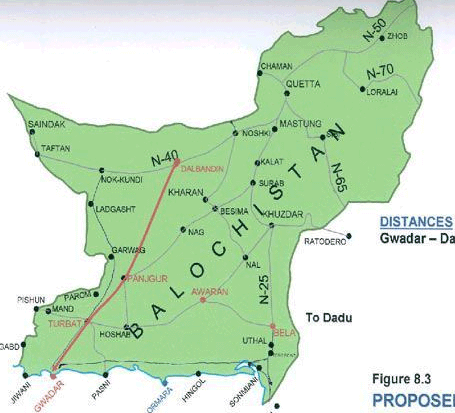Though Hindus have richly contributed in the economic prosperity and development of Pakistan's restive Balochistan province since pre-partition days, they are today faced with the dilemma of survival and living "dangerously".
Historically, it is not clear in documents to assert how and when Hindus originally settled in Balochistan. But the Balochistan-based Baloch and Hindu historians and writers agree that Hindus have been living here since time immemorial along with Buddhists, according to columnist Muhammad Akbar Notezai of the Daily Times.
He says Hindus ruled Balochistan before the invasion of the Arabs in 712 A.D.
In his article, "The Balochistan Hindus' dilemma", Notezai says today "Hindus are considered low caste. They are treated unequally and as second grade citizens. They are living isolated lives in their separate localities. They do not have the right to vote. The standard of their children's education is abysmal."
In Balochistan, Hindus have two ancient sacred places -- the Hinglaj Shrine in lasbela district, and Kali Devi, dedicated to Goddess Kali, in Kalat town.
During partition, communal riots were rampant in the subcontinent but Hindus lived harmoniously and peacefully in the princely state of Balochistan, which was under Yar Muhammad Khan, the chief ruler of the Kalat state. He respected the indigenousness of Hindus while giving them economic and religious freedom. Thus, the Hindus did not leave Balochistan during partition of the subcontinent.
Though Hindus lived amicably with the Baloch and Pashtuns, many had to leave Balochistan's Pashtun belt to settle in Baloch-populated areas or migrated to India after partition. In 1941, the Hindu population was 54,000 in Balochistan's Pashtun belt which soon dwindled by as much as 93 per cent after 1947.
Notezai, quoting a prominent Hindu intellectual Sham Kumar, writes that in contemporary times "Hindus are now facing a situation worse in Baloch residing places than they had to face in the past living in Pashtun residing places".
"Because the Baloch elders, who would show great respect for their neighbourhood Hindus, are no longer living in this world, or they have become very old."
For Baolchistan's economic prosperity and development, Hindus have built schools, libraries and hospitals. Many of the educated Hindus have been offering services in health, education and other sectors.
The Daily Times article said it is profoundly shocking that Hindus are now living dangerously in Balochistan".
"They cannot even perform their religious practices freely due to the nightmarish situation where they interminably fear for their lives, faith, honour and property."
"Hindus, in spite of being Balochistan's peaceful and largest minority, are running from their old 'motherland' to escape persecution, because their lives are in a precarious and worsened condition these days."
"In Balochistan, it was the 1990s period that turned into a great conflagration for Hindus. After that, gradually the Hindus' manifold problems, whether it was abduction, religious persecution, migration or killing, all of them have been intensifying."
"Many Hindu families have migrated to India, inside Pakistan to Karachi, and interior Sindh. But they are economically living a pathetic life in these places. There are many more Hindus who still utter the words 'migration' and 'insecurity' in Balochistan."
In Balochistan, there has been mass Hindu migration from the districts of Kalat, Khuzdar, Quetta, Mastung, lasbela, Hub, Nushki, and Dalbandin.
According to Dr. Shah Muhammad Marri, a well-known Baloch historian, "This land has been burning for the last 30 years. It has become an inferno for all the castes."
"Same is the case with the Hindus, the Christians, the Hazaras, the Baloch and the Pashtuns. All of them are migrating from pillar to post to find a safe place."
Balochistan's Minority Minister Basant lal Gulshan, a Hindu, however, denies reports of Hindus migrating from Balochistan.
The government officials, on the other hand, say majority of Hindus who have been migrating from Balochistan or the country are economically sound. They see a bright future for their children in India.
"But it is worth mentioning here that 90 per cent of the Hindus of Balochistan are unsound economically. They cannot afford to leave their indigenous places and settle somewhere else, especially India."
Notezai wrote: "... a sane person or community would never give up their connections to their place of birth until or unless circumstances compel them."
Hindus - whose exact numbers are not known - also complain that their sufferings hardly and rarely get discussed in mainstream media. They rely on private TV channels to highlight their sufferings. Nearly 35 Hindus were killed during former dictator General Pervez Musharraf's regime where he launched the fifth military operation against Nawab Akbar Khan Bugti, the former chief minister of Balochistan.
Bugti used to keep the Hindus in proximity to his legendary fort in Dera Bugti to safeguard them from criminal elements. "That is why many Hindus, mainly women and children, were killed and sustained severe injuries in the assault against Nawab Bugti on March 17, 2005."
To a lesser extent, the last government would also be held responsible for the Hindus' sufferings. "That is why the incoming government should be civilised and democratically elected so that Hindus may find a solution to their tragic dilemma," said Notezai.

















